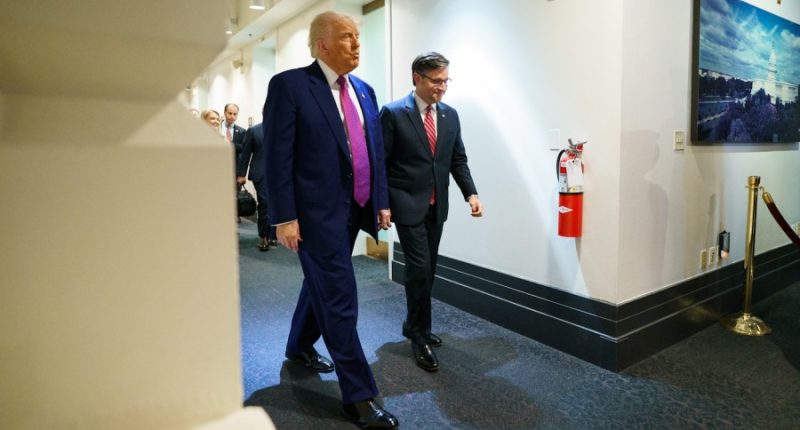Share this @internewscast.com

President Trump’s forceful pitch for House GOP lawmakers to rally around the party’s “big, beautiful bill” fell flat Tuesday, as two groups of holdouts hard-line conservatives and moderate blue-state Republicans are still demanding changes to win their support.
During a nearly two-hour meeting in the Capitol basement, Trump urged Republicans to support his agenda bill as Speaker Mike Johnson’s (R-La.) self-imposed Memorial Day deadline for passing the package inches closer.
The trouble was, he didn’t seem to change the minds he needed to.
“The president I don’t think convinced enough people that the bill is adequate the way it is,” said Rep. Andy Harris (R-Md.), the chair of the conservative House Freedom Caucus. Several members of the Freedom Caucus are among the loudest critics of the legislation.
“I can’t support it the way it is right now,” he added. “We’re still a long ways away.”
On spending cuts, the president urged lawmakers not to “f‑‑‑ with Medicaid,” as those on the right flank demand more muscular changes to the social safety net program.
On the state and local tax (SALT), meanwhile, the president pressed moderate Republicans from high-tax blue states to relent on their push for a higher deduction cap.
Those moderates, too, are holding the line.
“While I respect the president, I’m not budging on it,” Rep. Mike Lawler (R-N.Y.), a prominent member of the SALT Caucus, said after the meeting with Trump.
Trump told lawmakers he was comfortable with the bill as it currently stands, according to Rep. Dusty Johnson (R-S.D.). It includes a $30,000 deduction cap for individuals making $400,000 or less a format that members of the SALT Caucus deem a nonstarter.
“I’m still a no on the Jason Smith number,” Rep. Nick LaLota (R-N.Y.) said, referring to the $30,000 cap, which House Ways and Means Committee Chair Jason Smith (R-Mo.) included in the bill. “I hope that the president’s presence here today motivates everybody, especially my leadership, to give the SALT Caucus a number to which we could actually say yes.”
The defiance among both camps is creating a dilemma for Johnson. Taken together, the opposition is more than enough to sink the bill on the floor.
The Speaker, for his part, is remaining optimistic.
“Failure is simply not an option,” Johnson said after the meeting, arguing Trump “could be the most consequential president of the modern era.”
“I think this is the way we deliver that,” he added. “And by extension, that means that this Congress could be the one of the most consequential in history.”
Johnson said meetings with small groups of members will continue throughout the day.
There was, to be sure, some positive movement for Johnson. Rep. Ralph Norman (R-S.C.), for example, declared before the Trump meeting that he was a “no” on the bill, questioning Medicaid provisions and pointing to the “math problem” involving the package.
But after hearing from Trump who he said gave “one of the best speeches I’ve heard” Norman was far less forceful, saying his job was to read the bill “and then make a judgment.”
And Rep. Victoria Spartz (R-Ind.), who often stakes opposition to fiscal measures in the House, was notably positive even as she declined to articulate a stance on the legislation.
“We need to pass legislation to start growing the economy. It’s really badly needed,” Spartz said. “But there are a few things that it’s important to accomplish for us doing that bill, because defrauding the federal government is insane right now in health care.”
Despite those rosier comments, the overwhelming consensus among holdouts was that the bill is not yet ready for prime time.
“If they put a bill on the floor and it doesn’t have the [SALT] fix, I’m not sure the bill passes,” said Rep. Andrew Garbarino (R-N.Y.), a member of the SALT Caucus. “There’s still Medicaid problems with people, there’s still SNAP [Supplemental Nutrition Assistance Program] problems with people.”
“If they put the bill on the floor as is, I think there’s a lot of no votes,” he added, telling reporters he did not think Trump did enough to ease concerns.
Beyond the SALT Caucus and House Freedom Caucus, other members are perturbed by the state of the bill, too. Rep. Thomas Massie (R-Ky.), who has said for months that he won’t support a package that piles trillions of dollars more onto the national debt, said it’s too late to convince him to support the bill.
“Not at this hour. They’re down to SALT, and they’re down to Medicaid,” Massie said.
“There’s no doubt in my mind that this is going to balloon our debt.”
Trump had called out Massie by name during the meeting, ribbing the Kentucky maverick for opposing the legislation at the heart of the president’s domestic agenda.
Still, Massie said Trump’s pitch was “very persuasive,” predicting it was potent enough to flip the holdouts and set the stage for passage of the package this week, in time to meet Johnson’s self-imposed deadline.
“I predict that the president persuaded the Freedom Caucus and the blue-state Republicans to give up their fights and go along,” Massie said.
“I think he probably closed the deal in there.”










